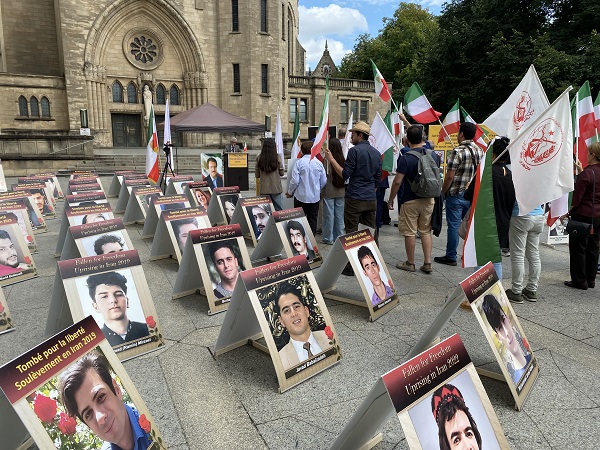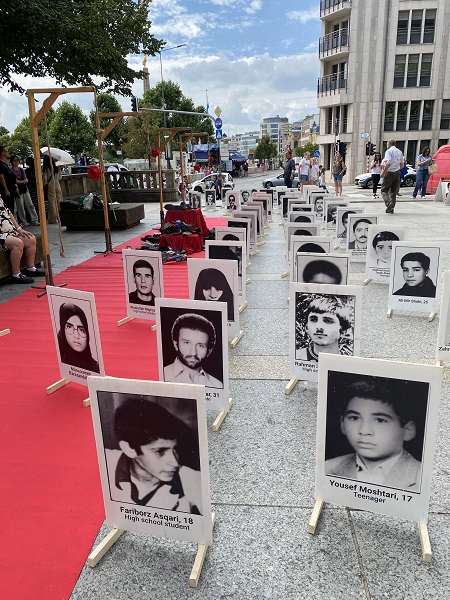 Demonstration in front of Notre-Dame Cathedral in Luxembourg City, 26 July 2025;
Credit: Association des Jeunes Iraniens au Luxembourg
Demonstration in front of Notre-Dame Cathedral in Luxembourg City, 26 July 2025;
Credit: Association des Jeunes Iraniens au Luxembourg
The Iranian community in Luxembourg has been holding weekly demonstrations in the capital to draw attention to the human rights situation in Iran.
The latest demonstration, organised by the Association for Human Rights in Iran and the Iranian Youth Association in Luxembourg, saw Iranian community members, human rights advocates and concerned citizens gather in front of Notre-Dame Cathedral in Luxembourg City on Saturday 26 July 2025.
The rally - and accompanying exhibition - highlighted the situation of more than a dozen political prisoners sentenced to death for their affiliation with the People's Mojahedin Organization of Iran (PMOI/MEK), the main opposition group.
Weekly protests in Luxembourg
Speaking to Chronicle.lu about the purpose of these regular demonstrations in Luxembourg City, Ali Fatemi, President of the Iranian Youth Association, explained: “We have been campaigning to stop the wave of growing executions in Iran.” Farideh Ab Salan, President of the Association for Human Rights in Iran, added that the protests aim to “highlight human rights abuses in Iran”, with demands including “ending executions, releasing political prisoners, seeking justice for victims and increasing international pressure on the Iranian regime.” She stressed: “We are the voice of the Resistance Units inside Iran, who bravely fight against the regime, are arrested and sentenced to death.”
Participants include members - and allies - of the Iranian community, notably former political prisoners and human rights activists who have “experienced of witnessed the oppression and suppression in Iran,” according to Ali Fatemi. Many of them are supporters of the National Council of Resistance of Iran (NCRI) and the PMOI/MEK, some of whom “spent years in Iranian prisons during their youth for defending freedom and opposing tyranny” and have lost loved ones to executions, according to Farideh Ab Salan. “Today, they speak out to demand justice, end repression and call for the release of political prisoners,” she said. “This community is striving for the return of freedom and democracy in Iran,” Ali Fatemi added.
These individuals are joined in solidarity by “friends, colleagues and compassionate citizens from diverse backgrounds”, which, according to Farideh Ab Salan, “reflects a shared commitment to universal human rights and support for the Iranian people.” Many young people have also joined, representing a “new generation […] that is tired of all forms of dictatorship and firmly rejects both clerical tyranny and monarchy.”
The rally organisers expressed support for the ten-point plan of NCRI President-elect Maryam Rajavi, calling for “a free, democratic, republic and secular Iran”. They advocated her “Third Option” for the future of Iran, which “lies neither in appeasement nor in war” but rather “the overthrow of the Iranian regime by the Iranian people and their organised resistance”. Farideh Ab Salan argued that “we are witnessing how years of appeasement have only led to war and further instability. The world must now recognise that it is time to support this third option”. She urged governments to back this proposal and “help implement democratic change”.
The organisers also supported Maryam Rajavi’s proposal for an international fact-finding mission to visit Iranian prisons and for direct contact with political prisoners.
Response to recent executions in Iran
Just one day after the latest Luxembourg demonstration, on Sunday 27 July 2025, the Iranian regime executed two political prisoners, Behrouz Ehsani and Mehdi Hassani, both affiliated with the PMOI/MEK.
According to Amnesty International, the two men were “executed in secret in Ghezel Hesar prison in Karaj, Alborz province”. The NGO condemned the executions, with Kristine Beckerle, Deputy Regional Director for the Middle East and North Africa, stating: “Behrouz Ehsani and Mehdi Hassani were executed arbitrarily amid Iran’s horrific execution crisis, which has resulted in nearly 700 people hanged this year.” She argued that these executions “highlight the authorities’ ruthless use of the death penalty as a tool of political repression in times of national crisis to crush dissent and spread fear among the population.”
Amnesty International reiterated its call for an immediate moratorium on executions “with a view to completely abolishing the use of the death penalty”. The organisation also urged international criminal investigations into Iranian officials suspected to be responsible for torture and other crimes under international law.
Maryam Rajavi, for her part, took to social media to call on the United Nations and human rights advocates “to take decisive action in response to this brutal crime”. “Continued inaction serves only to embolden this bloodthirsty regime at a moment when it is at its most vulnerable,” she warned. “Silence and hesitation are interpreted as a licence to escalate repression and further executions. Many PMOI and other political prisoners are facing imminent execution. The international community must act with urgency and resolve to save their lives.”
Reacting to the executions, Ali Fatemi noted: “Just [one day earlier] we were calling on the international community to intervene and stop these unlawful executions. Despite our efforts, the regime moved forward, silencing two more voices in its ongoing campaign of repression.”
Farideh Ab Salan added: “Governments' inaction allowed repeated calls from human rights organisations and various parliaments to prevent the execution of Behrouz and Mehdi to be ignored. It is time to put an end to this inaction in the face of a regime of executions, torture and terror.” She argued that the European Union - and the Luxembourg government - “can play an influential role in addressing the critical human rights situation in Iran”.
Shabnam Madadzadeh, President of the International Association of Women's for Justice in Luxembourg, a fellow activist and former political prisoner, similarly condemned the executions and agreed that the Luxembourg government “can play a leading role in Europe by recognising the Iranian people's struggle for freedom and democratic change”.
Personal involvement
For many activists in Luxembourg, the cause is deeply personal.
Farideh Ab Salan shared that two of her brothers were killed by the Iranian regime - one in 1982 and the other in 1988 after five years in prison: “I carry in my heart the pain of my mother's longing and the suffering of our entire family for a loss we weren't even allowed to mourn. We have all been wounded by this regime and we do not want the new generation to go through the same pain.”
She urged the Luxembourg government to “take a leading role in recognising the Iranian people's right to resist the regime” and to designate the Revolutionary Guards (IRGC) as a terrorist organisation. She also called for official recognition of Maryam Rajavi's “Third Option”.
Ali Fatemi also shared his personal motivation: “As an Iranian, I feel a deep sense of responsibility toward my country and my people. I consider it my duty to work for a free Iran in the future. […] Only we, the people, can bring about freedom and democracy - no one else will do it for us. Therefore, I feel obligated to pursue this path, even if the cost is great.” He acknowledged, however, that “this struggle cannot be fought alone […]. That is why we must continue this fight collectively, as part of a group and an organised movement”, namely the NCRI and the PMOI/MEK, which he believed would “restore freedom and democracy to Iran.”
Speaking on behalf of the rally organisers and participants, he said: “We call on the Luxembourg government: Go beyond statements. Take action. Sanction every official involved [...]. The IRGC must be designated as a terrorist organisation. All diplomatic and economic ties with this regime must be made conditioned to stopping the executions and unconditional release of all political prisoners.” He argued that, ultimately, the “only real solution is to support the policy of regime change from within by recognising the Resistance Units in Iran and the 'third option' proposed by Maryam Rajavi.”
Shabnam Madadzadeh echoed these sentiments: “As a former political prisoner who spent five years in various prisons and solitary confinement cells of the Iranian regime, I have experienced the regime's brutality firsthand. My brother and sister were killed by the Revolutionary Guards, and I have personally spoken with survivors of the 1988 massacre - when 30,000 political prisoners […] were executed […] following the ceasefire of the Iran-Iraq war. I carry the burden of this genocide on my shoulders.”
“I have seen the suffering of the executed and touched the cruelty of the clerical regime up close, especially what thousands of Iranian women have endured,” she continued. “That is why the fight for a free Iran - for the democratic and secular republic that the people of Iran truly want, for an Iran without gallows, for a country where women enjoy full equal rights, especially in leadership, and for a nuclear-free Iran - has become the central mission of my life.”
She too called for international action and support for Maryam Rajavi’s ten-point plan: “We say: No to war, no to appeasement. The path to peace in the region and freedom in Iran is through strong support for the Iranian people and their organised resistance”.
About the rally organisers
The Association for Human Rights in Iran is a Luxembourg-based NGO committed to documenting and promoting human rights in Iran. “Our mission includes raising awareness, supporting victims and advocating for accountability,” explained Farideh Ab Salan. “We publish reports, organise events and work with international bodies to amplify the voices of Iranian civil society.”
The Association des Jeunes Iraniens au Luxembourg (Iranian Youth Association in Luxembourg) is a youth activism group, formally established in 2014, that advocates human rights and democracy for Iran. “We regularly organise protests, exhibitions and solidarity rallies to raise awareness about the human rights abuses in Iran,” said Ali Fatemi.









